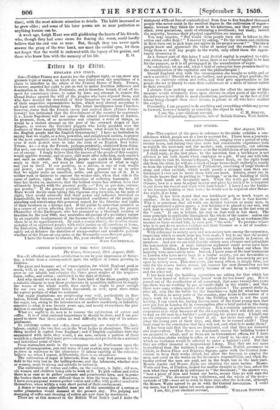Zottors to t4o ettitur.
ENGLAND AND ITALY.
Six—Neither France nor Austria has the slightest right, or can show any grounds legal or moral, on which she may found even the semblance of a claim to interfere in the affairs of the Central States of Italy. France, however asserted her right to put an end to undue Austrian influence and domination in the Italian Peninsula, and is therefore bound, if out of ro- ved for consistency alone, to resist by force any attempt to restore the Grand Dukes against the will of the peoples who have deposed them, and who have decreed the downfall of their dynasties by an unanimous vote of their respective representative bodies, which were elected according to all legal and constitutional forms. The latest intelligence from Florence, however, states that the French envoy just arrived there (Prince Ponia- towsky) has intimated that the Government of the country he represents (i. e.. Louis Napoleon) will not oppose the armed intervention of Austria. In presence, then, of so monstrous and criminal a state of things, as would be a violent attempt on the part of the crowned despot of that Empire, to restore the wretched puppets who lately presided over the destinies of these happily liberated populations, what would be the duty of the English people and the English. Government? I have no hesitation in saying that we ought, as a free, powerful, and enlightened nation, to protest in the most emphatic and forcible manner against so infamous a proceeding, even if such protest were to take the form of an English fleet before Trieste, &c.--a step the French, perhaps prudently, abstained from doing. But now, one word as to the responsibility a Cabinet would incur by such an act of energy. I firmly believe that the masses of the people of this country would approve warmly, and at once, still more after reflection, such conduct and such an attitude. The English people are quick in their instincts, Seedy in their wit, and keen in their appreciation of what is right and just in itself. If our position, as a nation, is one of vast wealth and power, and great strength, it has been granted to us in order that we might make an unselfish, noble, and generous use of it. It is neither rash or Quixotic to espouse the weaker side, when that side is the cause of justice, right, and the vindication of suffering humanity. All time has shown us, moreover, that the boldest course has seldom been that ultimately fraught with the greatest perils :—" Fais ce que dois, avienne que pourra." If the present patriotic Ministers who grasp the helm of -State would decide upon taking this vigorous step forwards, on the path of right, they would assuredly find their power and influence increased an hundredfold, by the renewed and invigorated confidence of the people ap- plauding and sanctioning this generous regard for the liberties and rights of their brethren in a foreign land. If the public be somewhat sensitive as to a course of action affecting their pockets in a vital degree, the present Chancellor of the Exchequer, who haspromised us a thorough revision of taxation for the year 1860, may neutralize all qualms of a pecuniary nature by an equitable readjustment of the Income-tax, if injustice and partiality there be in its apportionment. By such a course abroad, the fearless cham- pionship of an oppressed people, with strict justice on all questions at home, the Executive, whether aristocratic or democratic in its composition, may safely set at defiance the diatribes of stump-orators and would-be patriots whether of the Peace-at-any-price or the Normanby-cum-Bowyer party.
I have the honour to remain, Sir, your obedient servant,
WEST COUNTRYMAN.


























 Previous page
Previous page